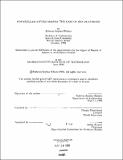Controlled environments : the case of Rio de Janeiro
Author(s)
Ribeiro, Roberto Scipiao
DownloadFull printable version (14.63Mb)
Other Contributors
Massachusetts Institute of Technology. Dept. of Architecture.
Advisor
Dennis Frenchman.
Terms of use
Metadata
Show full item recordAbstract
This study describes and analyzes the changing impact of "security" on the form of cities by exploring two residential settings, Nova Ipanema and Novo Leblon, in the city of Rio de Janeiro, Brazil. These developments have established a new post-modern version of the European medieval walled cities. The need for safety in the city has caused affluent citizens to react, by supplying themselves with the kind of services that were once the municipality's responsibility. As a result one can see increased subdivision of the urban fabric into virtual miniature cities. These secluded residential pockets are a tentative answer to a pervasive need for security and control, which is significantly disrupting the traditional form of the city. The study concludes that, as local economic problems worsen and government services lessen, increased private-based measures are likely to dominate the urban scene.
Description
Thesis (M.S.)--Massachusetts Institute of Technology, Dept. of Architecture, 1990. Includes bibliographical references (leaves 97-99).
Date issued
1990Department
Massachusetts Institute of Technology. Department of ArchitecturePublisher
Massachusetts Institute of Technology
Keywords
Architecture.